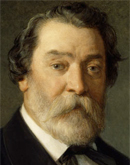

Theophil von Hansen
*13. 7. 1813 – Copenhagen, Danemark
†17. 2. 1891 – Wien, Austria
Biography
Theophilus Edvard Hansen was a Danish-Austrian builder and architect creating in the neoclassical and historicist style. He was one of six children of the cellist and insurance employee Rasmus Hansen Braathen (1774-1824) from Eiker in Oslo and Sophie Elisabeth Jensen from Nyboder in Copenhagen. His older brother was architect Christian Hansen (1803-1883). However, he was not related to the pioneer of Danish Palladianism, Christian Frederik Hansen (1756-1845), who was strongly inspired by Roman antiquity. Both brothers drew inspiration from his work during their time in Greece near the Athenian Acropolis. After studying at the Royal Academy of Fine Arts in Copenhagen under Gustav Friedrich Hetsche (graduating in 1836), he moved to Athens in 1837, where he continued to study Hellenic art. Gradually, he began to draw neoclassical designs that convinced Athenian urban planner Eduard Schabert (who was also a business partner of his brother Hans Christian Hansen) to commission him for his first building project, which was the observatory in Athens. Hansen stayed in Athens for a total of eight years. From 1869, his buildings were directed by his student and Saxon architect Ernst Ziller. Greek-Austrian banker Georg Simon von Sina valued Hansen's Greek realizations and invited him to Vienna, where he executed designs in the "Greek style." In Vienna, Hansen worked as an assistant to Ludwig Förster, and he married Förster's daughter, Marie Sophie (she died after six months of marriage). Among his first realizations was the Museum of Military History in the Arsenal, built from 1850-56 and opened to the public in 1869. Hansen took the Venetian Arsenal as a model. In 1858, the demolition of the city walls and the construction of the Ringstrasse began. At that time, Theophil Hansen was one of the most prominent architects in Vienna; in 1863, he was appointed an honorary citizen of Vienna, in 1867 he was knighted by Emperor Franz Joseph I, and in 1868 he was appointed a professor at the Vienna Academy, for which he constructed a new building, where he worked until 1883. In the same year, he completed the building of the parliament, constructed in the spirit of a Greek temple, thus referring to the origins of the democratic system.
Theophilus Edvard Hansen was a Danish-Austrian builder and architect creating in the neoclassical and historicist style. He was one of six children of the cellist and insurance employee Rasmus Hansen Braathen (1774-1824) from Eiker in Oslo and Sophie Elisabeth Jensen from Nyboder in Copenhagen. His older brother was architect Christian Hansen (1803-1883). However, he was not related to the pioneer of Danish Palladianism, Christian Frederik Hansen (1756-1845), who was strongly inspired by Roman antiquity. Both brothers drew inspiration from his work during their time in Greece near the Athenian Acropolis. After studying at the Royal Academy of Fine Arts in Copenhagen under Gustav Friedrich Hetsche (graduating in 1836), he moved to Athens in 1837, where he continued to study Hellenic art. Gradually, he began to draw neoclassical designs that convinced Athenian urban planner Eduard Schabert (who was also a business partner of his brother Hans Christian Hansen) to commission him for his first building project, which was the observatory in Athens. Hansen stayed in Athens for a total of eight years. From 1869, his buildings were directed by his student and Saxon architect Ernst Ziller. Greek-Austrian banker Georg Simon von Sina valued Hansen's Greek realizations and invited him to Vienna, where he executed designs in the "Greek style." In Vienna, Hansen worked as an assistant to Ludwig Förster, and he married Förster's daughter, Marie Sophie (she died after six months of marriage). Among his first realizations was the Museum of Military History in the Arsenal, built from 1850-56 and opened to the public in 1869. Hansen took the Venetian Arsenal as a model. In 1858, the demolition of the city walls and the construction of the Ringstrasse began. At that time, Theophil Hansen was one of the most prominent architects in Vienna; in 1863, he was appointed an honorary citizen of Vienna, in 1867 he was knighted by Emperor Franz Joseph I, and in 1868 he was appointed a professor at the Vienna Academy, for which he constructed a new building, where he worked until 1883. In the same year, he completed the building of the parliament, constructed in the spirit of a Greek temple, thus referring to the origins of the democratic system.
The English translation is powered by AI tool. Switch to Czech to view the original text source.












